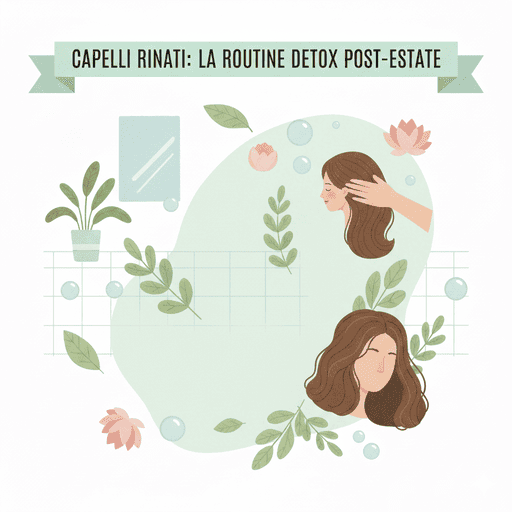Introduction
Shampoo is the heart of any haircare routine, yet it's often chosen superficially, based solely on the scent or the promise on the label. In reality, behind a good natural formula lie fundamental aspects such as the quality of the surfactants, the pH balance, and the presence of functional ingredients targeted to your hair type.
In this comprehensive guide, we'll discover what makes natural shampoo unique, how to read labels, and the most popular types—from anti-dandruff shampoo to anti-hair loss shampoo, including dry shampoo, anti-yellow shampoo, and solid shampoo.
Surfactants in natural and organic shampoos
Surfactants are the cleansing substances that allow you to remove dirt, sebum and impurities from your hair.
- Harsh surfactants such as SLS or SLES cleanse deeply, but can irritate the skin and dry out the hair fiber.
- Gentle plant-based surfactants (Sodium Cocoyl Isethionate, Coco-Glucoside, Lauryl Glucoside, Disodium Cocoyl Glutamate) guarantee effective yet gentle washing, perfect even for frequent washing or fragile hair.
A natural shampoo always chooses gentle and biodegradable surfactants, reducing the risk of irritation and environmental impact.
The Role of pH in Natural and Organic Shampoos
pH directly affects the health and appearance of hair:
- The scalp has a physiological pH of approximately 4.5 – 5.5.
- A shampoo with an acidic pH helps keep the cuticles closed, making hair shinier and less frizzy.
- Too high a pH (alkaline) can weaken the hair fiber, making hair dull and difficult to detangle.
Quality natural shampoos are formulated with a balanced pH, respecting the scalp and preserving natural hydration.
Most searched types of natural and organic shampoos
Natural shampoo for oily hair
Ideal for those suffering from excess sebum: contains purifying extracts such as nettle, sage, lemon, and tea tree. It regulates sebum production without being harsh.
Natural shampoo for dry hair
Dry hair needs hydration: aloe vera, light oils (argan, jojoba, coconut), shea butter, and plant proteins are perfect allies for nourishing without weighing it down.
Natural anti-dandruff shampoo
Contains balancing and sebum-normalizing ingredients such as rosemary, nettle, neem, burdock, and zinc PCA. It helps combat dandruff by keeping the scalp clean and healthy.
Natural anti-hair loss shampoo
Often enriched with caffeine, ginseng, nettle, rosemary, and plant peptides that stimulate microcirculation and strengthen the hair bulb. Excellent as a support during periods of stress or seasonal changes.
Natural anti-yellow shampoo
Designed for blonde, bleached, or gray hair. It uses plant pigments and lightening herbs like chamomile and rhubarb to neutralize unwanted yellow tones and brighten light tones.
Natural solid shampoo
An eco-friendly, plastic-free, and concentrated alternative. It's long-lasting, takes up little space, and is formulated with gentle surfactants and natural ingredients. Perfect for those seeking sustainability without sacrificing performance.
How to choose the right natural and organic shampoo for you
There is no universal “best shampoo”: the choice depends on your hair type and your needs.
- Sensitive scalp → extra gentle shampoo with chamomile, colloidal oatmeal, calendula.
- Colored hair → protective formulas with acidic pH and natural antioxidants (pomegranate, green tea, flaxseed).
- Frequent washing → light and rebalancing shampoos with delicate surfactants and aloe vera.
Practical tips for use
- Use a small amount of product, diluting it if necessary.
- Gently massage your scalp with your fingertips.
- If your hair is very dirty, prefer two light washes.
- Complete your routine with a natural conditioner or mask to balance hydration and softness.
Daiana's Tip ✨
If you want to get the most out of your natural shampoo, try diluting it with a little water before using it. This simple step helps distribute it better on your scalp, avoids waste, and makes washing more gentle. Hair feels clean and light, and the product lasts much longer.
Natural and organic shampoos produce less foam: does this mean they clean less?
No: the amount of foam doesn't indicate effectiveness. Gentle surfactants create a softer foam but cleanse without damaging.
Which natural and organic shampoo should I use for seborrheic dermatitis?
Better to choose specific formulas with rebalancing ingredients such as nettle, neem, burdock and without aggressive fragrances.
Which is better: solid or liquid natural and organic shampoo?
It depends on your habits: the solid one is eco-sustainable and concentrated, the liquid one is more practical for those who love the traditional formula.
Does natural and organic shampoo replace conditioner?
No, shampoo cleanses. Conditioner completes the routine by closing the cuticles and making hair easier to comb.
How often should you wash your hair with natural and organic shampoo?
It depends on your hair type: those with greasy hair can use it every day, while for dry and curly hair, 2-3 washes a week are enough.
Are natural and organic solid shampoos less effective than liquid ones?
No, they are just as effective but are more concentrated, last longer, and are an eco-friendly choice.
Conclusion
Natural shampoo is much more than a cleanser: it's a beauty ally that respects hair, skin, and the environment. Understanding the role of surfactants and pH, knowing the most common types, and choosing the right product for your needs allows you to have healthy, shiny, and strong hair day after day.
👉 Discover our selection of natural shampoos and find the perfect one for your hair.
Discover the complete section dedicated to hair routines






































































